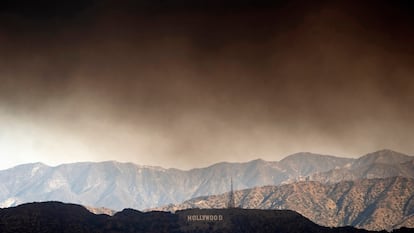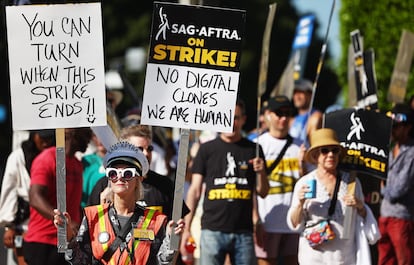Hollywood is starring in its own horror movie
The entertainment industry in California has absorbed blow after blow: first the pandemic, then strikes, inflation, competition from other states and, in January, the wildfires


These are glittering days in Hollywood. Awards season, red carpets, glamour... But the reality in Los Angeles, the city that hosts most of the studios — and the salaries — of film and television companies, is very different and not particularly festive. There is no work. At the very least, it is scarce. And now, with wildfires having raged for weeks, the situation has worsened even more. So much so that California is beginning to lose jobs and population as people seek their futures elsewhere, a decision driven due to this widespread loss.
The U.S. Bureau of Labor Statistics says that employment is at its lowest level in 30 years, but the situation is also complex and long-lasting. The lack of jobs is not only the general topic of conversation, it is also beginning to claim victims: The Los Angeles Times (which has created specific content on financial and healthcare assistance) is already talking about suicides; the specialized media Deadline, of systemic mental health problems. The causes are multiple, the first being the dual strikes by actors and screenwriters in the second half of 2023. That caused shoots to decrease by almost half compared to the same period in 2022: from 9,000 to about 5,500, according to FilmLA, the official film office of the City and County of Los Angeles.
The strikes concluded at the end of 2023, which may seem a long time ago now, but productions were already on hold and took a while to recover. In addition, the collective bargaining agreement improved, which is favorable for workers but not so much for the large production companies, platforms, and entertainment companies, which find it more expensive to create content in an already extremely expensive California. Today, not only are fewer series being commissioned, but those that are run for fewer episodes. According to FilmLA, in the first three quarters of 2024, the shooting of series and films in the city continued to fall, slightly increasing (by 6.2%) in the last quarter. Across last year there were barely 5,800, the lowest level since the pandemic. On average, 31.3% fewer films were shot in the city than in the last five years. That has meant a huge loss of jobs across the board, from makeup artists and producers to stuntmen and studio executives: more than 12,000 jobs were lost between May 2023 and May 2024, according to data from the California employment office.

Furthermore, California seems less competitive than other states that have seen the goldmine and provide more aid to productions: although it offers $330 million in tax benefits a year, New York offers $700 million and others like Georgia, with Atlanta as a key point for filming — and, therefore, a focus of migration for many workers: among the series shot there are Sharp Objects, Ozark, and Stranger Things — have no cap. That’s without taking into account other countries that encourage filming, such as Canada, which is nearby, cheaper, and provides stunning landscapes and better conditions. The governor of California, Gavin Newsom, proposed doubling the tax benefits for cinema a few months ago. Now, an organization called Stay In LA is seeking to eliminate the tax cap for at least three years, as well as taxes and fees on productions; they claim that for every dollar invested, $24.40 are created in “new economic activities in local businesses,” among other benefits. Launched in mid-January, it has already collected the signatures of over 19,500 industry members and California citizens, including Keanu Reeves, Olivia Wilde, and Bette Midler.
The motto of many entertainment workers — generally professionals who have been qualified for many years and are well paid, but who work on a temporary and limited basis — for months has been Survive till ‘25. But the new year has not started in the best of ways. Several wildfires, especially the Eaton and Palisades blazes, left 28 people dead and destroyed thousands of homes, a situation that will not exactly aid the recovery of the sector. During the worst days of the fires, filming was suspended due to the poor air quality, the difficulty in traveling, and adverse weather, as well as out of respect for those who lost everything. The landscapes have also changed and resources are now more limited, from water to the security and firefighting personnel needed on sets.
Hollywood been in turmoil for a year and a half now, but the situation shows no signs of improving. Last August, Los Angeles Mayor Karen Bass said she was considering new incentives for an industry that is “critical to the economic vitality” of the region because it employs more than 680,000 people and generates $115 billion. Now, those promised funds, like so many others, are likely to be put to better use. And entertainment industry workers will still have to survive, again, in 2025.
Sign up for our weekly newsletter to get more English-language news coverage from EL PAÍS USA Edition
Tu suscripción se está usando en otro dispositivo
¿Quieres añadir otro usuario a tu suscripción?
Si continúas leyendo en este dispositivo, no se podrá leer en el otro.
FlechaTu suscripción se está usando en otro dispositivo y solo puedes acceder a EL PAÍS desde un dispositivo a la vez.
Si quieres compartir tu cuenta, cambia tu suscripción a la modalidad Premium, así podrás añadir otro usuario. Cada uno accederá con su propia cuenta de email, lo que os permitirá personalizar vuestra experiencia en EL PAÍS.
¿Tienes una suscripción de empresa? Accede aquí para contratar más cuentas.
En el caso de no saber quién está usando tu cuenta, te recomendamos cambiar tu contraseña aquí.
Si decides continuar compartiendo tu cuenta, este mensaje se mostrará en tu dispositivo y en el de la otra persona que está usando tu cuenta de forma indefinida, afectando a tu experiencia de lectura. Puedes consultar aquí los términos y condiciones de la suscripción digital.








































